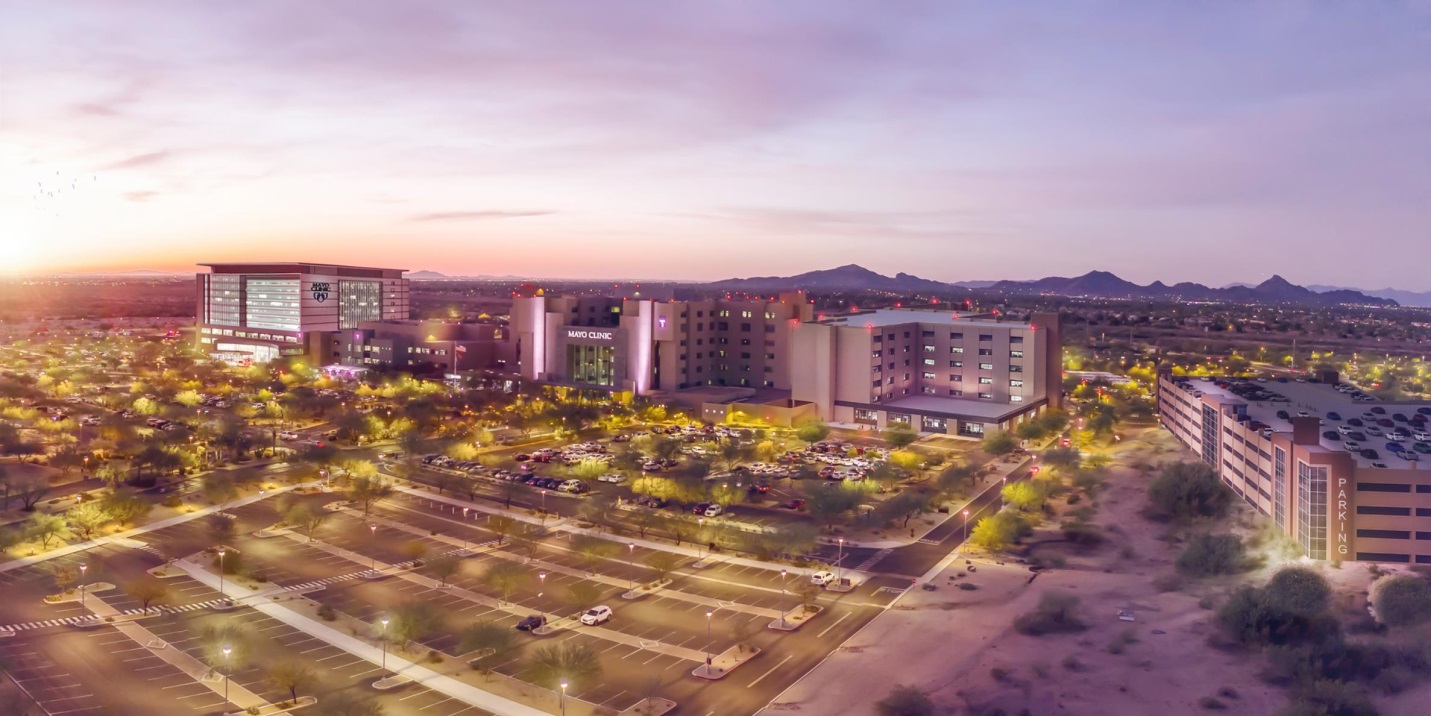-
Arizona
Mayo Clinic doubling the size of its Phoenix campus to meet patient demand

PHOENIX – To meet the increasing demand to treat patients with complex health conditions in the growing Southwest, Mayo Clinic announces a $648 million expansion that will nearly double the size of its Phoenix campus over five years.
The Arizona Forward Project will add 1.4 million square feet of building space (to the existing 1.7 million) with expanded clinical capacity, support services and infrastructure at the campus located near Loop 101 and 56th Street in North Phoenix.
The expansion plan increases the number of inpatient beds from 280 to 374 by 2023 and creates close to 2,000 new jobs, including nearly 200 physicians by 2029.
“Patients recognize that Mayo Clinic provides some of the best and safest care in the United States. Growing our facilities in Arizona to accommodate increased demand is essential,” says Wyatt W. Decker, M.D., Vice President, Mayo Clinic, and CEO of Mayo Clinic in Arizona, which was recently again ranked No. 1 in the state by U.S. News & World Report’s Best Hospitals, and is the only Arizona medical center on the prestigious U. S. News Honor Roll. “Mayo’s commitment to the health and vitality of Arizona began when we saw our first patient in Arizona more than 30 years ago. Arizona Forward represents our commitment for the next several decades and beyond – innovating to improve the physical health of patients and the economic health of the state we call home.”
The highlights of the expansion include a new six-story patient tower; a three-floor addition to the existing four-story Mayo Clinic Building; a new three-story building to house an expanded Emergency and other departments; expanded patient and infrastructure space; and additional parking.
Arizona Forward is a five-year project with new patient areas projected to open as early as June 2020, culminating with the final phase opening in April 2023.
News of Mayo Clinic’s expansion was welcomed by Arizona Governor Doug Ducey who said it will support the state in a variety of ways.
“Mayo Clinic’s presence in Arizona has propelled our state’s health care and bioscience industry, and their enhanced investment is another sign that this industry is thriving,” says Gov. Ducey. “Not only will those of us in Arizona be served by expanded services at Mayo Clinic, but it will further secure Arizona as a global destination for excellence in health care.”
As a premier destination medical center in the Southwest, Mayo Clinic has experienced significant campus growth in Arizona over the last five years. Expansion projects on the campus have included the consolidated Cancer Center in the new Mayo Clinic Building, the Proton Beam Facility and the Image Guided Operating Rooms. Other factors that have supported the growth of Mayo’s Arizona practice include increasing specialization in cancer care, neurosurgery, cardiovascular disease and transplant, along with new and expanding insurance contracts.
Mayo Clinic Hospital in Phoenix, was recently ranked No. 1 in Arizona and the Phoenix metro area, and No. 11 nationally by U.S. News & World Report. This marks the second time Mayo Clinic has been recognized with two hospitals on U.S. News & World Report's "Best Hospitals Honor Roll," which includes the top 20 hospitals in the nation. Mayo Clinic’s campus in Rochester, Minnesota, ranked No. 1 nationally.
Since opening its Scottsdale, Arizona location more than 30 years ago and its hospital in Phoenix in 1998, Mayo Clinic has grown to become a vital part of health care and medical research in Arizona and throughout the Southwest. Mayo Clinic has brought many medical innovations to Arizona, including Mayo Clinic School of Medicine – Arizona Campus, the development of the first proton beam therapy program in the Southwest, and pioneering work in regenerative medicine and individualized medicine. Also, within the past year, Mayo Clinic's Arizona campus has grown to become one of the largest organ transplant programs in the U.S., and the hospital’s nursing program has received Magnet quality status from the American Nurses Association.
Expansion Details Overview
New Structures:
- Six-story patient tower featuring new patient rooms, clinical and rehab space and an outpatient surgical center
- Three-story building to house expanded Emergency Department, Laboratory Medicine, Radiology and Pharmacy
- Central plant building to support additional building square footage
- 1,000-space underground patient parking garage
- 1,600-space multilevel staff parking garage
- Tunnel connecting existing hospital basement with west expansion basement for equipment, material and staff flow
Current Structure Expansion:
- Mayo Clinic Building will grow from three to seven stories for current and future clinical services
Capacity Impact:
- Inpatient capacity will increase by 94 beds, allowing growth in critical care, intermediate, medical/surgical and rehabilitation beds
- Surgical capacity will increase by five operating rooms, in the hospital and in the outpatient surgical center, as well as expansion of Pre-op/Post-Anesthesia Care Unit, Surgical Pathology and Central Sterile spaces
- The Emergency Department will increase from 26 to 57 beds, with an adjoining 24-bed Observation Unit
- An incremental 130,000 square feet of ambulatory clinical space will be added
- Expansion of important clinical programs such as Radiology, Apheresis, Dialysis, Ambulatory Infusion Center, Pulmonary Rehab, Pain Rehab and Pain Clinic
- Doubling the capacity of Laboratory Medicine
- Increasing Endoscopy capacity
- Increased support space for Pharmacy, Food Services, Supply Chain Management, Environmental Services and the cafeteria
###
About Mayo Clinic
Mayo Clinic is a nonprofit organization committed to clinical practice, education and research, providing expert, comprehensive care to everyone who needs healing. Learn more about Mayo Clinic. Visit the Mayo Clinic News Network.
Media contact:
- Jim McVeigh, Mayo Clinic Public Affairs, 480-301-4222, mcveigh.jim@mayo.edu







